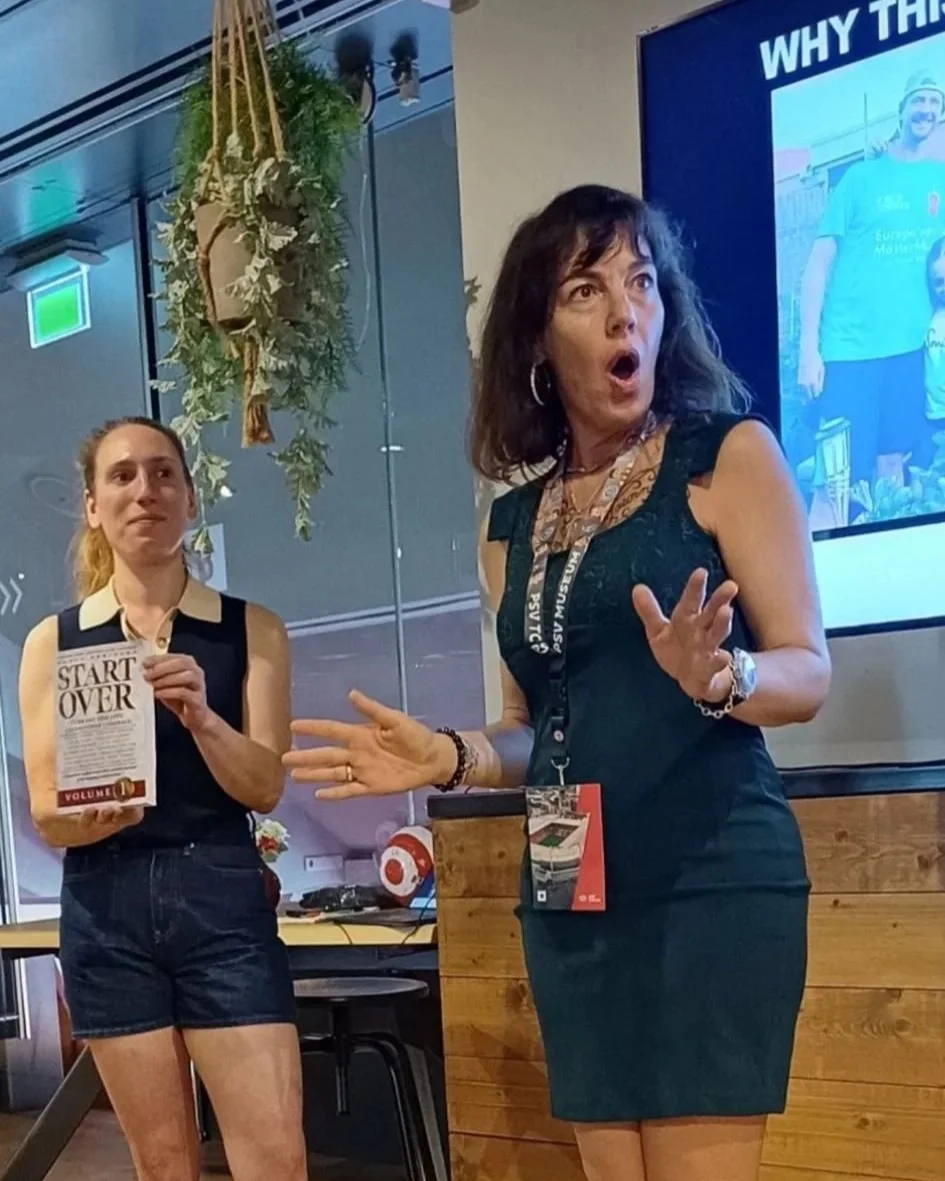Annick Ruelens
Author & Public Speaker
- Age 49
- Belgium Helecine
- Nationality Belgian
- What defines her "Born crazy, different and alive"

Who is Annick?
Hello world, here is my story. I am Annick Maria, the highly sensitive girl that went to hell and back. Life was nothing but easy. I have survived where most others would have given up. Dealing with bullying, different addictions, stripping, sex industry, mental and physical abuse, grief and loss of dear ones and much more… But here I am still standing, because I have a voice, and it needs to be heard. My mindset, resillience and spiritual awakening have given me the courage and motivation to come forward and claim my power back, being unstoppable no matter what.
Professional Recommendation
Coming soon…
Goals
Annick's Present and Future
Present: Currently, I’m hidden homeless, living in Helecine Belgium, looking for a rental place of my own. My 31 year old car has been my bestie for few years.I survive on disability income and have been surfcouching with family and friends for the last 15 months , realizing it’s time to move forward. I’m still struggling and on the healing path, but my vision is there, expanding, growing. Despite all, today I am co-authoring a book with Sir Marco Robinson. My story will finally be out there for people to read, because one voice can change a lot.
Future: I see myself doing what I love, being emotionally fulfilled, helping people, and being financially free. I envision travelling :promoting books I write, and being a worldwide speaker. Positive impact is the outcome. Endless possibilities are my message.Learning how to navigate hardship is the tool. The property of my dreams is in the sun, near a beach, where I would cook healthy meals, make art as a therapy, spending quality time with my life partner and French bulldogs. We would walk aside each other, making the world a better place, healing one person at a time.
The status meter below identifies the Homeless Entrepreneur’s current HELP program stage.
Click here to read more about our HELP Program, and understand its different phases and stages.
Housing
Stage 1: Homeless Homeless people living in public spaces, external spaces or night shelters. Stage 2: Houseless Homeless people living in homeless hostels, temporary accommation, transitional supported accomodation, women's shelter accomodation. Stage 3: Insecure Housing Homeless people temporarily living with family/friends, squatting, or under the threat of eviction or violence need to advance to stage 4 or 5 as quickly as possible Stage 4: Inadequate Housing Homeless people living in temporary/ un-conventional structures, unfit housing or extreme overcrowding need to advance to stage 5 as quickly as possible. Stage 5: Dignified Housing Have a safe, affordable and clean place to call home allows one to focus on building a future as a contributing member of society.Health
Stage 1: Disengaged & Overwhelmed Being disengaged, overwhelmed and exhausted is common for many homeless people due to the high level of stress and overall poverty being experienced. Stage 2: Becoming Aware but still Struggling Homeless individuals face difficulties with sleep, fatigue, and daily tasks, leading to stress and low self-esteem. Establishing a beneficial routine can be a challenge. Stage 3: Maintain Behaviors & Pushing Forward Homeless people find it hard to improve their health due to poor sleep, low self-esteem, and stress. They know they should establish healthy habits, but it's tough. Stage 4: Healthy Lifestyle Once this stage has been reached, the objective is to maintain it and mitigate the risk of entering homelessness again.Professional Development
Stage 1: Disengaged & Misinformed Poverty can isolate people from their community and vital information, causing division instead of unity. Stage 2: Motivated but Lacking Network Homeless individuals need community connection, accurate information, and a supportive network to stay motivated and continue personal and professional growth. Stage 3: Entering Workforce & Building Professional Skills Building a positive network can help homeless individuals find job opportunities and develop stronger professional skills. Stage 4: Discovering True Professional Potential Knowing your strengths and weaknesses helps you reach your full potential as a business professional and optimize your resources and time for a happier, healthier career.Training
Stage 1: Outdated Training Many skills that one has learned become obselete due to technological advances, which means that one must accept a new professional reality. Stage 2: Basic General Training Building basic general knowledge, skills and competences allow one to enter the desired professional sector for an entry level position or as an intern. Stage 3: Intermediate Sector-Specific Training Focused sector-specific training can lead to career growth within or outside an organization. Stage 4: Advanced Sector-Specific Training At this stage, the professional has proven he or she is competitive in his or her sector and has the opportunity to open doors for HEs in earlier stages.The HELP program consists of three phases:
Phase one, which lasts up to 12 months, is divided into 7 stages, where each Homeless Entrepreneur (HE) is assigned a coordinator and nine managers (covering the following areas: professional development, education, health, housing, finance, legal, communication, sales and general assistance).
Communication
Presentation Skills To introduce oneself well, use clear structure, strong material, the right tone, and control body language. Negotiation Skills Learning how to communicate, persuade, plan, strategize and cooperate allows one to reach a compromise and attain her or his goals faster. Business Writing Skills Efficient business writing skills will allow one to provide relevant information in the right style, which is clear and easy-to-read, within the right context. Influencing Skills Positive behavior can influence others to change. Cross-Culture Communication Having a deep understanding of different cultures can help individuals integrate smoothly into society. Win-Win Conversation Conversations focused on all parties that are involved feeling good about the actions and desired outcomes help create new opportunities, growth & potential value. Selling Skills Being able to sell oneself and/or products and services help one get a job, keep it and evolve professionally. Teamwork Building Knowing everyone's strengths and weaknesses helps maximize group productivity by utilizing each person's unique abilities.Legal
Stage 1: Forgotten or Unattended Legal Issues Non-criminal legal problems like government benefit claims, evictions, child custody, and employee rights can impact civil liberties and often go unattended. Stage 2: Resolving Legal Issues With the right legal support, homeless people can afront these issues and resolve them in a timely manner so they can overcome unnecessary administrative roadblocks. Stage 3: Law Abiding Citizen Obeying the law means they are protected from it and can focus on developing other aspects of their life as contributing members of society.Finances
Accounting Skills Being in control of one’s financial health and being able to plan for the future allows one analyze investments, reach savings goals, control debt and focus on profitability. Financial Analysis Skills Understanding one’s financial performance allows one to track and analyze the past and present in order to create a clearer financial forecast. Forecasting Skills Being able to measure the accuracy of predicting one’s financial future allows one to plan ahead and be better prepared for financial ups and downs. Risk Management Skills Identifying potential causes of accidents or loss allows one to implement preventive measures, and devise plans to minimize costs and damage. Finance Reporting Skills Organized and concise financial data helps make better decisions for financial health. Financial Literacy Skills Understanding and effectively applying financial skills, i.e. personal financial management, budgeting and investing, allows one to be financially autonomous.HELP Progress Bar
Annick’s Support Community
All of Annick’s stakeholders play an important role in creating new sustainable opportunities that will inspire both individual and systemic change.
Her Stakeholder Community
City Halls
Neighbor communities
Authors and public speakers
Dutch people and Dutch institutions
Individuals and institutions that support poverty reduction and ending homelessness
Retired citizens
Professors and universities
Private Donors
Monthly donations will provide greater stability for Annick.


